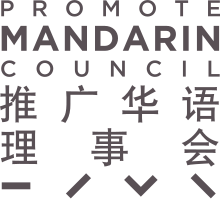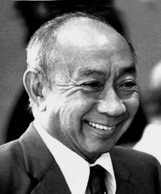
The Promote Mandarin Council is a Singaporean organisation established in 1979 as part of then-PM Lee Kuan Yew's programme to promote Mandarin as the preferred language amongst Chinese Singaporeans.

The Promote Mandarin Council is a Singaporean organisation established in 1979 as part of then-PM Lee Kuan Yew's programme to promote Mandarin as the preferred language amongst Chinese Singaporeans.
In 1966 the Singapore Government institutionalised a bilingual education policy, under which Singaporean students were required to learn both English and their "designated mother-tongue". For ethnic-Chinese Singaporeans, the designated language was Mandarin, in line with the national language policy pursued in both Nationalist and Communist China. The Goh Report, an evaluation of Singapore's education system by Dr. Goh Keng Swee, claimed that less than 40% of the student population managed to attain the minimum level of competency in two languages. [1] The Government then alleged that learning of Mandarin amongst the Singapore Chinese was hindered by the home use of various varieties of Chinese. These varieties included Hokkien, Teochew, Cantonese and Hakka. [2] [3] Since then, the Singapore Government has pursued a hostile stance against these varieties, and has promoted the use of Mandarin as a universal mother-tongue amongst Singapore Chinese.
In 1979, then-PM Lee Kuan Yew decided to establish the Promote Mandarin Commission as an organisation focused entirely on the promotion of the Mandarin language, with the initial goal of eliminating all other Chinese varieties in Singapore within the next decade. In 1998, the Commission was officially renamed as the Promote Mandarin Council.

Lee Kuan Yew, often referred to by his initials LKY, was a Singaporean statesman and lawyer who served as the first Prime Minister of Singapore from 1959 to 1990, and Secretary-General of the People's Action Party from 1954 to 1992. He was the Member of Parliament (MP) for Tanjong Pagar from 1955 until his death in 2015. Lee is widely recognised as the founding father of the modern Singaporean state, and for his leadership in turning and transforming it into a highly developed country during his tenure.

The People's Action Party (PAP) is a major conservative political party of the centre-right in Singapore. It is one of the three contemporary political parties represented in the Parliament of Singapore, alongside the opposition Workers' Party (WP) and the Progress Singapore Party (PSP).

Goh Chok Tong is a Singaporean former politician who served as the second Prime Minister of Singapore from 1990 to 2004 and Secretary-General of the People's Action Party (PAP) from 1992 to 2004. He was the Member of Parliament (MP) for Marine Parade SMC from 1976 to 1988, and Marine Parade GRC from 1988 to 2020.

Education in Singapore is managed by the Ministry of Education (MOE). It controls the development and administration of state schools receiving taxpayers' funding, but also has an advisory and supervisory role in respect of private schools. For both private and state schools, there are variations in the extent of autonomy in their curriculum, scope of taxpayers' aid and funding, tuition burden on the students, and admission policy.

Goh Keng Swee, born Robert Goh Keng Swee, was a Singaporean statesman and economist who served as 2nd Deputy Prime Minister of Singapore between 1973 and 1985. Goh is widely recognised as one of the founding fathers of Singapore. He was also one of the founders of the People's Action Party (PAP), which has governed the country continuously since independence.

Chinese Singaporeans are Singaporeans of Han Chinese ancestry. Chinese Singaporeans constitute 75.9% of the Singaporean resident population according to the official census, making them the largest ethnic group in Singapore.
The Special Assistance Plan is a programme in Singapore introduced in 1979 which caters to academically strong students who excel in both their mother tongue as well as English. It is available only in selected primary and secondary schools. In a SAP school, several subjects may be taught in the mother tongue, alongside other subjects that are taught in English. SAP schools currently cater only to those studying Mandarin as their mother tongue although theoretically, future SAP schools for other mother tongues are a possibility.
The Speak Mandarin Campaign is an initiative by the Government of Singapore to encourage the Chinese Singaporean population to speak Standard Mandarin Chinese, one of the four official languages of Singapore. Launched on 7 September 1979 by then Prime Minister Lee Kuan Yew and organised by the Promote Mandarin Council, the SMC has been an annual event promoting the use of Mandarin.

The 1964 race riots in Singapore involved a series of communal race-based civil disturbances between the Malays and Chinese in Singapore following its merger with Malaysia in 16 September 1963, and were considered to be the "worst and most prolonged in Singapore's postwar history". The term is also used to refer specifically to two riots on 21 July 1964 and 2 September 1964, particularly the former, during which 23 people died and 454 others suffered severe injuries.

The languages of Singapore are English, Chinese, Malay and Tamil, with the lingua franca between Singaporeans being English, the de facto main language. Singaporeans often speak Singlish among themselves, an English creole arising from centuries of contact between Singapore's internationalised society and its legacy of being a British colony. Linguists formally define it as Singapore Colloquial English. A multitude of other languages are also used in Singapore. They consist of several varieties of languages under the families of the Austronesian, Dravidian, Indo-European and Sino-Tibetan languages. The Constitution of Singapore states that the national language of Singapore is Malay. This plays a symbolic role, as Malays are constitutionally recognised as the indigenous peoples of Singapore, and it is the government's duty to protect their language and heritage.

The self-governance of Singapore was carried out in several stages. Since the founding of Singapore in 1819, Singapore had been under the colonial rule of the British. The first local elections on a limited scale for several positions in the government of Singapore started in 1948 following an amendment to the Constitution of Singapore.
The concept of race or ethnicity in contemporary Singapore emerged from the attitudes of the colonial authorities towards race and ethnicity. Before the early 2000s, the four major races in Singapore were the Chinese, Malays, Indians and Eurasians. Today, the Chinese-Malay-Indian-Others (CMIO) model is the dominant organising framework of race in Singapore. Race informs government policies on a variety of issues such as political participation, public housing and education. However, the state's management of race, as well as the relevance of the CMIO model, has been a point of contention amongst some in recent years.
Singaporean Mandarin is a variety of Mandarin Chinese spoken natively in Singapore. Mandarin is one of the four official languages of Singapore along with English, Malay and Tamil.
The National Day Rally is an annual message delivered by the Prime Minister of Singapore to the entire nation, on the first or second Sunday after National Day on 9 August. Started in 1966, the national day rally is Singapore's equivalent of the President of the United States’s State of the Union address. The prime minister uses the rally to review the country’s status, its key challenges, as well as to set the country's direction, major policy changes, the economy, future plans and achievements. Currently, the prime minister does the rally speech in all of its national languages, English, Mandarin and Malay, except for Tamil, where only dubbing is available from its English broadcast.
The Lee Kuan Yew School of Public Policy is an autonomous postgraduate school of the National University of Singapore (NUS), named after the late former Prime Minister of Singapore, Lee Kuan Yew.
The National Courtesy Campaign was a campaign launched in June 1979 by the Ministry of Culture of Singapore as a means of encouraging Singaporeans to be kinder and more considerate to each other, so as to create a pleasant social environment.
In Singapore, language planning is associated with government planning. In this top-down approach, the government influences the acquisition of languages and their respective functions within the speech community through the education system. Language planning aims to facilitate effective communication within the speech community, which can result in a language shift or language assimilation. The goals of language planning are very much dependent on the political and social forces present in Singapore during two distinct periods: Colonisation by the British and the Post-Independence period after 1965.
Singapore embraces an English-based bilingual education system. Students are taught subject-matter curriculum with English as the medium of instruction, while the official mother tongue of each student - Mandarin Chinese for Chinese, Malay for Malays and Tamil for South Indians – is taught as a second language. Additionally, Higher Mother Tongue (HMT) is offered as an additional and optional examinable subject to those with the interest and ability to handle the higher standards demanded by HMT. The content taught to students in HMT is of a higher level of difficulty and is more in-depth so as to help students achieve a higher proficiency in their respective mother tongues. The choice to take up HMT is offered to students in the Primary and Secondary level. Thereafter, in junior colleges, students who took HMT at the secondary level have the choice to opt out of mother tongue classes entirely. Campaigns by the government to encourage the use of official languages instead of home languages have been largely successful, although English seems to be becoming the dominant language in most homes. To date, many campaigns and programmes have been launched to promote the learning and use of mother tongue languages in Singapore. High ability students may take a third language if they choose to do so.

Singaporeans are the citizens and nationals of the sovereign island city-state of Singapore. Singapore is home to a people of a variety of ethno-racial-religious origins, with the city-state itself being a multi-racial, multi-cultural, multi-religious, multi-denominational, multi-lingual, and multi-ethnic country. Singaporeans of Chinese, Malay, Indian, Arab, Armenian, Eurasian, European, American, and Canadian descent have made up the overwhelming majority of the population since the 19th century. The Singaporean diaspora is also far-reaching worldwide.

On 23 March 2015, Lee Kuan Yew, the founding prime minister of Singapore and co-founder of the People's Action Party, died at the age of 91 at 03:18 Singapore Standard Time (UTC+08:00), after having been hospitalised at the Singapore General Hospital with severe pneumonia since 5 February that year. A formal announcement was made on national television and radio by Prime Minister Lee Hsien Loong at 08:00 that morning.